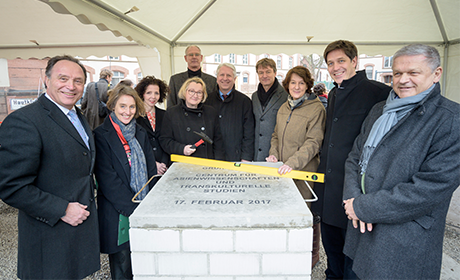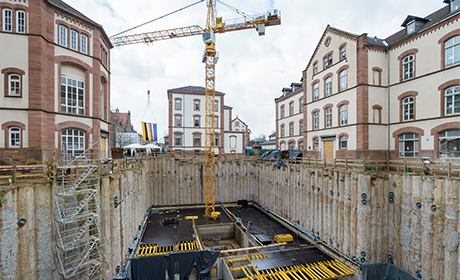An Extraordinary Location for a New Generation of Asia Specialists
20 February 2017
Cornerstone laying ceremony for the new Centre for Asian and Transcultural Studies

Photo: Rothe
Cornerstone laying at the Bergheim campus with Senior Construction Director Bernd Müller of the Baden-Württemberg State Office of Property and Construction (left), sinologist Prof. Dr Barbara Mittler, Project Manager Katrin Werkle-Geisinger, Minister of Science Theresia Bauer, University Library Director Dr Veit Probst, Heidelberg University President Prof. Dr Bernhard Eitel, architect Jan van der Velden-Volkmann, State Secretary Gisela Splett, City Councillor for Building and Construction Jürgen Odszuck, and indologist Prof. Dr Axel Michaels.
On this site, Heidelberg University will educate a new generation of Asia specialists able to fully understand and explore growing global challenges. The Bergheim campus will be home to the new Centre for Asian and Transcultural Studies (CATS), a place for research and teaching conceived as a "collaboratorium". It will also house a new library. The Mannheim and Heidelberg Bureau of the Baden-Württemberg State Office of Property and Construction had issued the invitation to the traditional cornerstone laying ceremony to be held in mid-February. The new research facility will cost approximately 27.2 million euros and take three years to build. Baden-Württemberg Minister of Science Theresia Bauer and Gisela Splett, State Secretary in the Baden-Württemberg Ministry of Finance, came to Heidelberg to attend the ceremony.
The Centre for Asian and Transcultural Studies brings together the research and teaching activities of various disciplines to address issues of Asian studies together with European studies. The underlying innovative concept is the transcultural exchange of perspectives. Research and teaching in Asian studies will not only be bundled and intensified, but will also engage in an exchange with the humanities and social sciences regionally aligned with Europe. The CATS includes the South Asia Institute, the Centre for East Asian Studies and the Institute of Anthropolgy. The Centre will be located adjacent to the substantively and organisationally related Heidelberg Centre for Transcultural Studies, which grew out of Heidelberg University’s Cluster of Excellence "Asia and Europe in a Global Context".
According to the State Finance Secretary, the new centre is "yet another milestone" in the university's overall development. "The combination of historical buildings and the main research building is extraordinary," stated Gisela Splett. For Theresia Bauer, the Centre for Asian and Transcultural Studies offers the special opportunity to add fresh perspectives to the European view of Asia. Excellent research "eases mutual understanding beyond cultural differences". "Particularly in times in which geopolitical boundaries are in vogue, institutions like the CATS are especially important", added the Minister of Science. President Prof. Dr Bernhard Eitel affirmed that with the Centre for Asian and Transcultural Studies, the university is creating space for two innovative fields of endeavour that took shape in the framework of the Excellence Initiative through the institutional strategy and the Cluster of Excellence „Asia and Europe“ and will now be permanently anchored at Ruperto Carola.
The Centre for Asian and Transcultural Studies on the Bergheim campus will comprise four buildings of the former Dermatology Clinic; they will be completely refurbished for use by the participating institutes. The structures, built early in the 20th century, enclose a square in the middle of which the new 5,000 square metres research facility will be erected. The new structure with its ground-floor entrance will extend four floors into the ground and house a shared library. Designed as a "collaboratorium", the area will allow central access to the resources of three libraries – the South Asian, East Asian, and Southeast Asian Studies libraries – as well as contain media laboratories to develop and use digital resources. Of the total construction costs, the federal and state governments are providing approximately 19.2 million euros for the research building portion. Work is scheduled for completion at the end of 2018.
Sinologist Prof. Dr Barbara Mittler and indologist Prof. Dr Axel Michaels, who now make up the founding directorate, were instrumental in submitting the proposal. Both researchers offered words of welcome at the cornerstone laying, as did Jürgen Odszuck, Councillor for Building and Construction for the City of Heidelberg. Senior Construction Director Bernd Müller of the Mannheim and Heidelberg Bureau of the Baden-Württemberg State Office of Property and Construction opened the ceremony at the construction site.

Photo: Rothe

